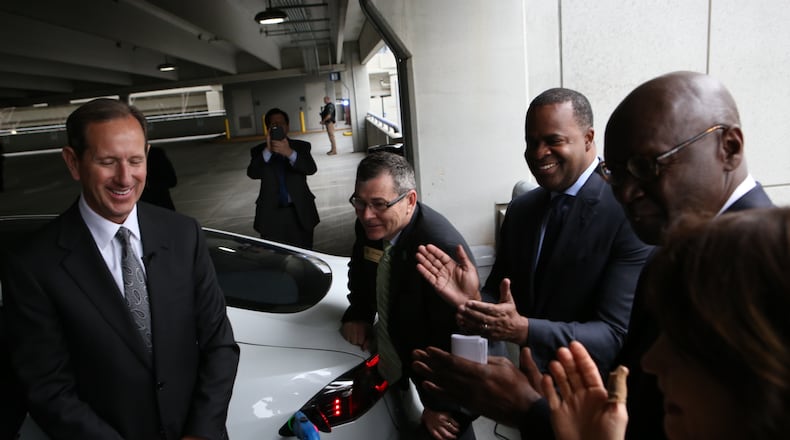Hartsfield-Jackson International has installed 102 electric vehicle charging spaces, a $1.3 million investment that Atlanta Mayor Kasim Reed called part of his effort to have "one of the greenest airports in the world."
The Atlanta airport plans to install another 200 electric vehicle charging spaces over the next couple of years.
"These stations reflect Hartsfield-Jackson's great commitment to sustainability," said Hartsfield-Jackson general manager Roosevelt Council.
Electric vehicle drivers must pay regular rates for parking, but do not have to pay extra to charge their cars. "We see it as a service," Council said.
But Hartsfield-Jackson is behind other airports in electric vehicle charging. Major airports around the country have had electric vehicle charging stations for years.
The much-smaller Savannah Hilton Head International Airport, for example, has had electric vehicle chargers since 2012, and also has Tesla superchargers.
"It's a customer convenience," said Lori Lynah, director of marketing and air service development for the Savannah airport.
San Francisco International has more than 150 spaces for electric vehicle charging.
Electric vehicle drivers have long pushed for charging stations at the world's busiest airport, but Hartsfield-Jackson was slow to prioritize electric vehicle charging.
Meanwhile, off-airport parking lots around Hartsfield-Jackson had installed dozens of electric vehicle charging stations, drawing some of that business away from the airport.
The airport had delayed the installation of charging stations as it developed a master plan for renovation and expansion, to avoid investing in infrastructure that would have to be torn down and replaced. The equipment installed now can be re-used when the airport demolishes and rebuilds its parking garages, and installation of electric vehicle charging stations will be part of the construction costs of those garages, according to Council.
The goal of installing 100 electric vehicle charging stations by the end of 2016 was an initiative of Reed's that fits into the city's goal to reduce vehicle emissions 20 percent by 2020. The city has also rolled out electric vehicles as part of its municipal fleet of cars.
"What it really speaks to is an attitude," said Georgia Public Service Commissioner Tim Echols. "Atlanta is committed to business and to sustainable practices."
The electric vehicle charging stations include 22 spaces at the domestic terminal South parking deck, 24 spaces in the domestic terminal North parking deck, 16 spaces in the international terminal hourly parking garage, 30 spaces in the international terminal park-ride deck, and other spaces in airport employee lots.
The spaces have either level 1 or level 2 chargers. The airport qualifies for $500 Georgia Power rebates for each of the 32 level 2 chargers it has installed.
However, the airport's parking lots do not have any DC fast chargers, which can recharge electric vehicles in under an hour in many cases.
There are more than 25,000 electric vehicles registered in Georgia, according to Don Francis, executive director of Clean Cities Georgia, part of a U.S. Department of Energy initiative. That's more than any other state except California, due to past tax incentives for electric vehicles in Georgia.
Once there are chargers everywhere, "there's no reason everyone shouldn't have electric vehicles," he said. "The movement toward electric vehicles -- I don't think you could stop it if you wanted to."
Francis said while the message under the Obama administration was on climate change, the incoming Trump administration will focus on energy independence.
The fragility of the dependence on gasoline was evident last year after the Colonial Pipeline leak that led to a gasoline shortages and price spikes, Francis said.
With electric vehicles, "this is domestically produced fuel, right here in Georgia," Francis said.
Domestic terminal North & South daily parking garages
$3 per hour
$16 per day
International terminal hourly parking garage
$2 per hour for the 1st & 2nd hours
$3 per hour for the 3rd-6th hours
$32 per day after 6th hour
$36 flat rate each additional day
International terminal park-ride garage
$3 per hour
$12 per day
About the Author
Keep Reading
The Latest
Featured



